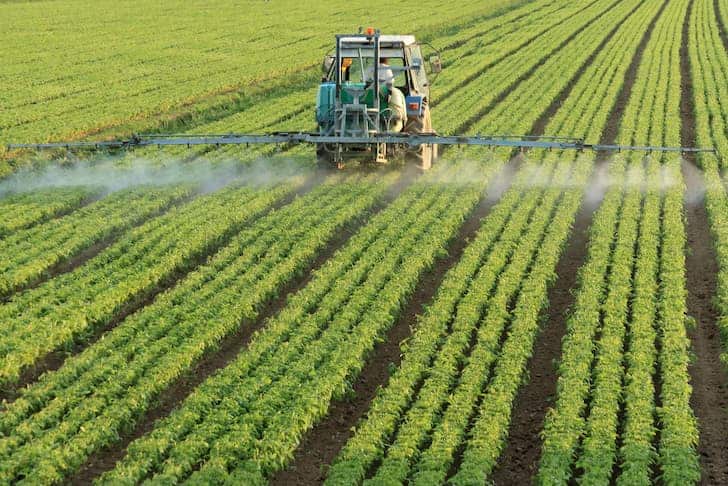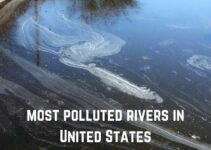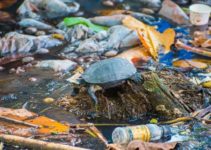Chemical fertilizers contain phosphates, nitrates that can actually be the main reason behind water pollution. Environmental nitrogen and phosphorous contribute to the process of Eutrophication, which enriches the water surface with nutrients. The trophic status of lakes is associated with the nutrients and growth of organic matters of the lake. The effect of Eutrophication is that there is an abundance of algal bloom.
The various symptoms of Eutrophication are as follows:
1. There is an increase in the production of biomass like phytoplankton, macrophytes and attached algae.
2. Since the assemblage in aquatic plants changes, there occurs a shift in the habitat characteristics.
3. The desirable fishes are replaced by a lesser desirable species.
4. The algae release various toxins.
5. While the algal bloom occurs, there is a change in the taste and odor of water.
6. When algal bloom occurs, there is a decrease in the oxygen level, which are fatal for fishes.
7. The irrigation canals get clogged with the excess of aquatic weeds.
8. There is a decrease in the recreational value of water as it’s infested with weed infestation, slime and noxious odor.
The usage of organic fertilizers results in the discharge of nitrate, potassium and phosphates that pollute the water. The contamination of groundwater occurs as a result of leaching due to nitrate. The ground and surface waters are infested with heavy metals, whose concentration poses a threat to humans and animals. Besides, the emission of ammonia from fertilizers results in acidification that decreases the purity of water bodies.
Why are Fertilizers Bad For Water?
Farmers use fertilizers for crops that help grow better quality, but at the same time, its harmful as the runoff from fields to rivers and water bodies make the quality deteriorate. Rainfall, snowfall, irrigation are the reasons why fertilizer makes its way to the nearby water bodies.
1. A high concentration of nitrogen contaminates the drinking water. Nitrates can leach into groundwater, and when found in animals in higher concentrations, can cause nitrate poisoning.
2. A higher concentration of nutrients that runs off to the water bodies results in Eutrophication. Algal bloom occurs in the water body because of this phenomenon. The result is that the oxygen level decreases and aquatic animals die. Also, the passage of water transportation becomes difficult.
3. Fertilizer runoff affects marine life badly. Since the drain of nutrients occurs, the chemicals result in the growth of microorganisms. This results in oxygen depletion, and the aquatic animals die due to suffocation.
4. Algal bloom occurs due to the drainage of fertilizers. This releases harmful toxins and has a great effect on marine creatures. These toxins suffocate the aquatic animals, and they are left to suffer and eventually die.
5. Due to excess of Eutrophication, an entire zone becomes affected, and they become dead zones. They show up near the major river mouths. The phenomenon causes a decrease in marine activity. Although algal activity can decrease with time, to get back to normalcy and previous healthy state, it takes considerable time.
Toxic runoffs of fertilizer into water bodies are considered harmful. Scientists have been conducting studies that state that limited usage of fertilizers is beneficial. In fact, the usage of organic fertilizer could be better in this respect as it doesn’t support the ill effects.
What are the Harmful Effects of Fertilizers on Water?
Fertilizers, which are often considered as plant foods, consist of compounds of nitrogen and phosphorous. They are commonly owned by homeowners aimed at maintaining and improving the beauty of the landscape and quality. But the increased amount has caused concern about the quality of lakes and water bodies.
The several ill-effects of fertilizers are as follows:
1. The lawn and garden chemicals are generally absorbed by the groundwater mainly by the process of leaching and also runoff. The groundwater becomes polluted, and the quality of water deteriorates, which has several ill effects on crops and pisciculture.
2. The excess of nutrients that occur from the fertilizers is instrumental in the algae bloom, which makes the passage of water transport impossible. When the algae die, it sinks to the bottom of the river bed that makes the aquatic animals impossible to survive due to the formation of dead zones.
3. When the chemicals from fertilizers have a run down into water bodies, the fishes ingest them and become diseased.
4. The crops which are produced as a result of irrigation from these infected waterbodies bear strains of the chemicals, and that could be harmful upon human consumption.
5. The chemicals, when get drained into rivers and other water bodies, can be infectious for the aquatic insects and caddie flies, which are the main food for the fish and frogs. Consumption of these aquatic foods could transmit the effect of chemicals on the human body.
6. Once the Eutrophication level of lakes increases, there is a problem in restoration and makes it fit for transportation.
In contrary to the effects mentioned above, organic fertilizers could be used so as to reduce the harmful effects on aquatic animals.
Are Fertilizers Polluted?
Fertilizers, also known as plant food, cause poisoning of plants. Fertilizers are meant to keep the plants healthy and enable them to grow fast, but the presence of certain chemicals will allow them to be pollutants, and in such cases, it’s essential to know how to get rid of them.
Plant food can be harmful to humans and pets if they are accidentally ingested, inhaled or even if they come in physical contact. Touching the fertilizers can cause skin irritation, and that is regarded as poisonous. Nitrogen, although essential for plant growth, but can be dangerous for humans if present in higher levels. For the human body, nitrates are known to reduce the capacity of red blood cells to carry oxygen.
Nonetheless, in case you are affected by plant food poisoning, you may develop the following symptoms.
1. Redness of skin
2. Burning sensation in the skin
3. Skin with an itchy feeling
4. Your eyes, throat and nose might appear to be burning.
However, if you ingest the plant fertilizers, you may experience these symptoms:
1. Fingernails, lips, and hands may turn blue due to lack of oxygen.
2. You might feel dizziness
3. You might likely have low blood pressure
4. You can experience seizures
5. You might be exposed to shortness of breath
6. You might experience stomach upset or feel stomach pain.
The use of fertilizers is permissible for non-edible plants. But, for edible plants, you must seek permission from consultants regarding the type of fertilizer you should use in plants. Various countries, including America, have experienced poisoning from indoor plants due to the use of fertilizers.
What Kind of Fertilizer is the Least Harmful to the Environment?
Fertilizers are instrumental in keeping the soil fertile by making it enriched with minerals like potassium, nitrogen, phosphorus, iron, magnesium and other essentials. However, a significant portion of the fertilizers is known to cause environmental pollution.
In order to meet demands, EFF or environment-friendly fertilizers are developed that are meant to reduce pollution. They can control the release of nutrients into the soil.
EFFs are mainly applied in the form of coated fertilizers, which is the primary reason why they can be utilized as an environment-friendly product. More research is being carried on for fertilizers having a coating that is degradable but is super absorbent. Here are some of the attributes of EFF.
1. EFF has got a coating that can prevent the exposure in water, as they serve as a barrier. The physical barrier reduces the rate of urea hydrolysis while also reduces the emission percentage of nitrogen dioxide and gaseous nitrogen.
2. EFFs will increase the organic content in the soil.
3. Coated EFF’s which are super absorbent, often act as a buffer to soil acidity or alkalinity.
4. These fertilizers can improve the water retention capacity of the soil.
The EFF fertilizers are effective in enhancing the efficiency of nutrients in the soil and reducing the pollution of the environment. Thus, they are used to have increased yield without causing any harm to the environment.
References:
https://www.scientificamerican.com/article/how-fertilizers-harm-earth/
https://www.healthline.com/health/fertilizers-and-household-plant-foods






